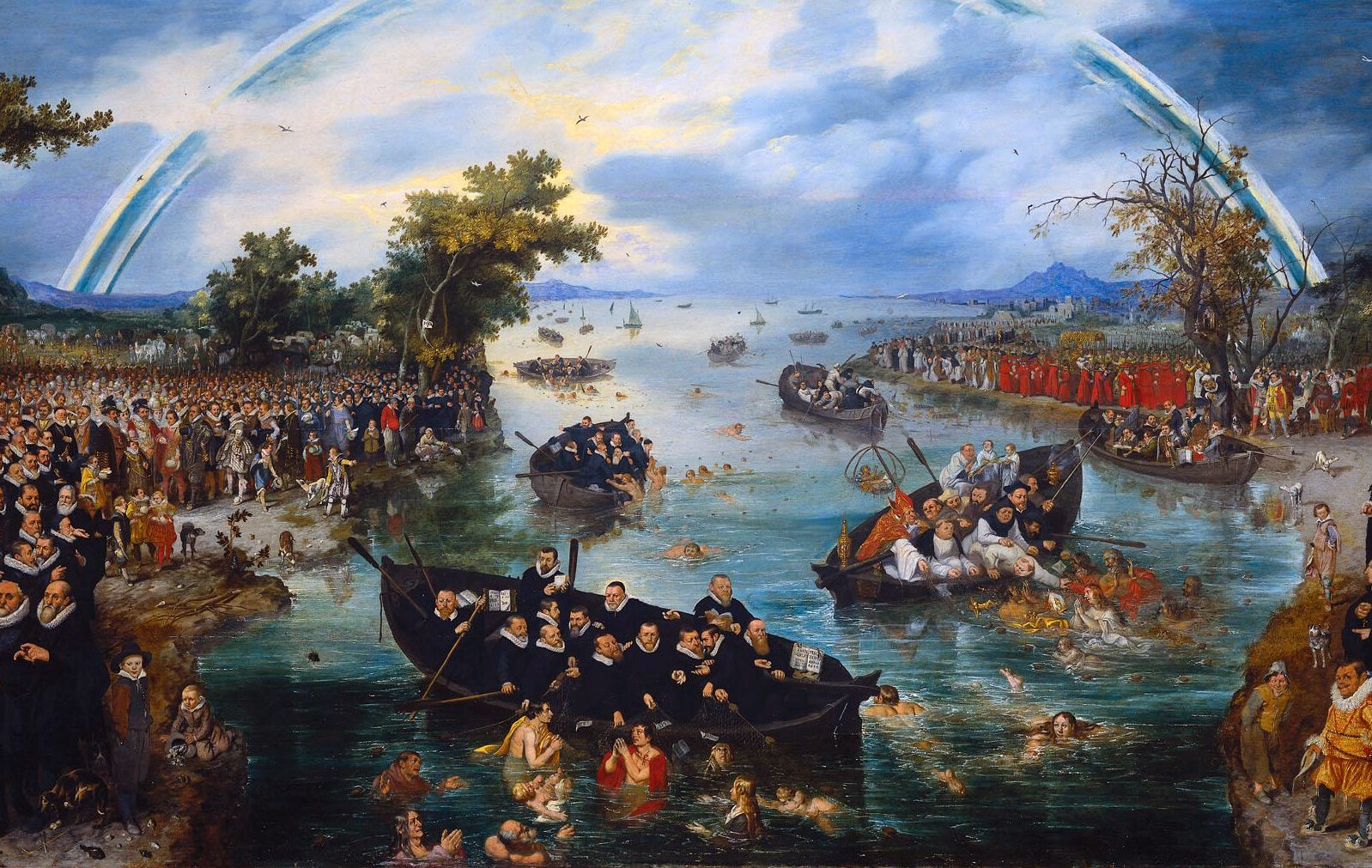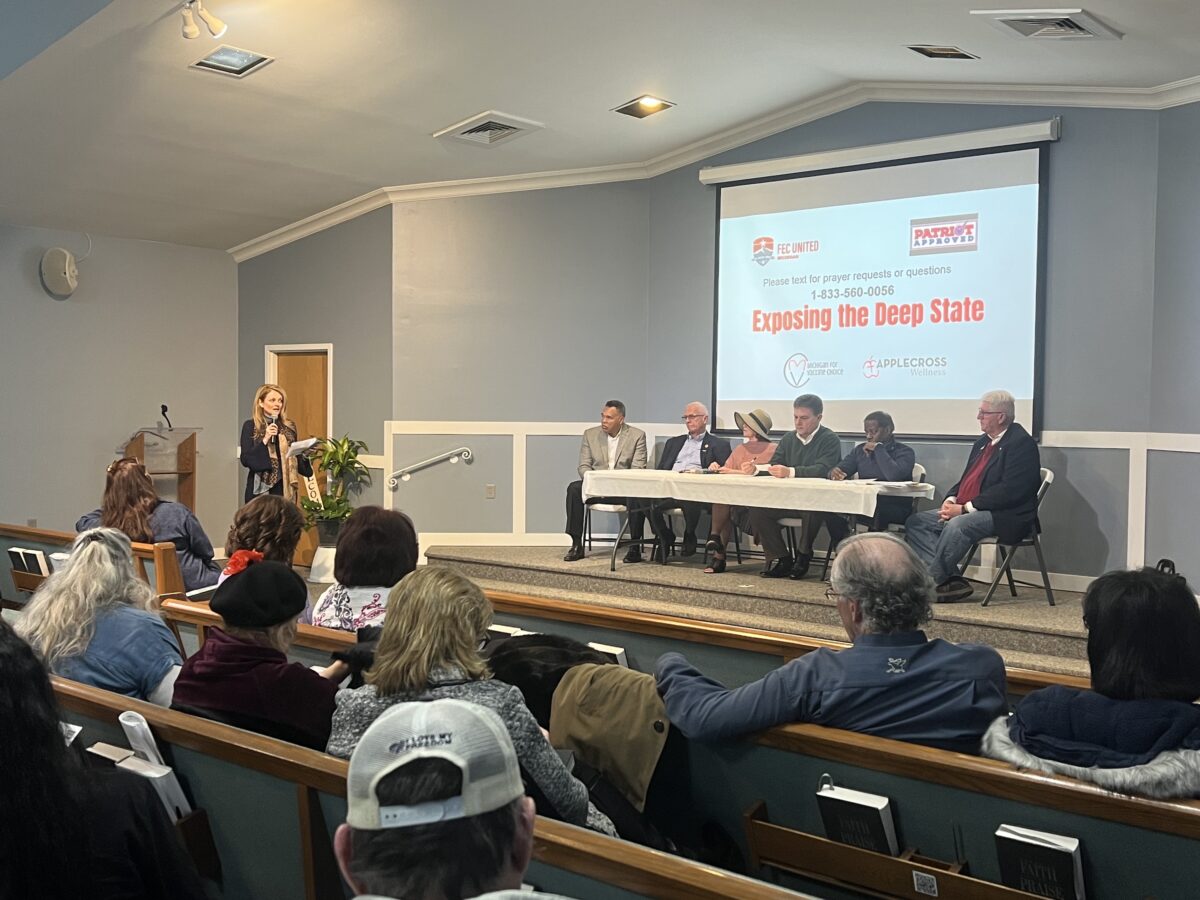Shop For Night Vision | See more…
Ever Changing, Ever the Same
Culture
Ever Changing, Ever the Same
Christianity’s mission in these latter days is much the same as it has always been—to perfect man rather than make a god.

Adriaen van de Venne’s Fishing for Souls, 1614
Ever Changing, Ever the Same
Christianity’s mission in these latter days is much the same as it has always been—to perfect man rather than make a god.

The following is adapted from remarks delivered at Washington College in Chestertown, Maryland, on May 1, 2023.
In a recent speech adapted and published in these pages, R.R. Reno offers some thoughts about the future of Christianity. His assessment of the current state of American Christianity is clarifying and his ideas about what the future may hold are thought-provoking.
His conclusion is particularly striking: that the future of Christianity may be to “preserve the possibility of being a human against the dream of being a god.” I suspect that this is correct given the trajectory of both the post-Christian left and right, which he so ably details.
But in another sense, this is always one of the tasks of Christianity in every age.
Since Eden, the temptation of humankind has been the serpent’s promise that “ye shall be as gods.” This temptation is rendered plausible because human beings occupy an in-between position between animals and God.
On the one hand, our created and embodied nature presents us with real limits that we are obliged to understand and to which we must acquiesce. On the other hand, we are capable of participating in the divine Logos and even of hoping for divinization through mystical union with God in the beatific vision.
This creates a tension within human beings, discernible even in pagan philosophers’ reflections.
Plato recognized that the best city is intelligible but not ultimately attainable for humans under ordinary circumstances; Aristotle’s definition of human beings as political meant, for him, that we are in between beasts and gods.
Though they lacked the fullness of truth revealed in Christ, these philosophers were able to probe both the possibilities and limits of the human condition through their rational contemplation of the nature of things.
For Christianity, created nature provides a substrate on which grace can build. As St. Thomas Aquinas formulated it, Gratia non tollit naturam, sed perficit: “Grace does not destroy nature but brings it to perfection.” As such, he concludes, natural reason should minister to faith, directing it toward its completion in grace.
Our capacity for natural reason means that higher things, like perfect goodness and perfect justice, are in some way intelligible to us, and we can even participate in them it in a limited way. But the limits imposed by our created and fallen nature means that we are ultimately constrained from attaining perfection in this life.
This dichotomy creates uncomfortable tension within human beings.
Christian heresies and ideological political projects share at least one thing in common: They each seek to resolve the tension in human existence by willing away some aspect of reality.
This is evident even in the etymology of heresy, derived from the Greek verb meaning “to choose.” Heresy is not the wholesale rejection of the truth, but instead consists in the deliberate choosing of which authoritative doctrines to affirm and which to deny.
Modern ideologies of both the left and the right share in common a rejection of the idea of nature as normative. This is because they deny the knowability of nature in any sense that could render nature meaningful in itself. For them, nature is only raw material to be subjected to the will, not a normative standard that may guide and limit us.This stems from the very beginnings of the modern project as put forth first by Niccolo Machiavelli and later by Francis Bacon. While Machiavelli denied the naturalness of morality in order to make room for the prince to act as he deemed necessary in order to impose order, Bacon sought to overcome nature for the relief of man’s estate through the application of method. Both Machiavelli and Bacon thought of themselves as, in some sense, returning to the true nature of things over against Christianity’s alleged tendency toward otherworldliness.
The Machiavellian project, in its essence, sought to elide the tension between the moral order and the necessities of political order, while the Baconian project sought to overcome the tensions inherent in the limitations of embodied being through the application of a scientific method. Whatever the benefits of these projects might be—and they should not be dismissed lightly—both both served to call into question the ancient and Christian idea that nature itself presents human beings with normative limits.
While we should be cautious about ascribing too much causal power to ideas alone, it seems clear that these ideas prepared the way for the kinds of radical denials found in Karl Marx and, ultimately, Friedrich Nietzsche.
While the trend toward a post-Christian Nietzschean Right that Reno discusses is no doubt correct, it is important to recognize the extent to which the modern Left is also descended from Nietzsche, mediated through postmodern leftist thinkers, led by Michel Foucault. Nietzsche’s use of genealogy to deconstruct traditional morality was furthered by Foucault’s application of the method to sanity, sexuality, even civilization itself.
To be sure, leftist ideology is less consistently Nietzschean than its rightist counterparts: As Joshua Mitchell has ably shown, the “woke” left takes many of its precepts from a secularized form of Christianity. But its denial of the knowability of nature and its reduction of all social interactions to power dynamics nevertheless give it a distinctly Nietzschean flavor.
Against this, orthodox Christianity preserves the idea of nature. As the passage from Aquinas considered above makes clear, Christianity affirms both the knowability and the normative power of nature, including and perhaps especially human nature.
In the Pensees, Blaise Pascal writes:
Man’s greatness comes from knowing that he is wretched: a tree does not know it is wretched. Thus it is wretched to know that one is wretched, but there is greatness in knowing one is wretched.
In other words, the capacity for self-knowledge about the limits of human existence constitutes man’s true greatness. Human beings are great because we can, in some limited but real way, know ourselves.
This view may be too pessimistic to satisfy the Nietzscheans of both the Left and the Right who dismiss human wretchedness as nothing but the playing out of power dynamics. But in an age that reviles limits of all kinds, the future of Christianity must begin with showing both the limits and greatness of human nature.
In the face of modern ideologies that promise salvation through the abolition of man, the thing most needed is the recovery of a genuine Christian humanism.
The post Ever Changing, Ever the Same appeared first on The American Conservative.
Shop For Survival Gear | See more…
-
Sale!

Quick Slow Release Paramedic Survival Emergency Tourniquet Buckle
Original price was: $14.99.$7.99Current price is: $7.99.
Add to cart
-
Sale!

Mesh Shooting Hunting Vest with Multi Pockets
Original price was: $59.99.$39.99Current price is: $39.99.
Add to cart
-
Sale!

Portable Mini Water Filter Straw Survival Water Purifier
Original price was: $29.99.$14.99Current price is: $14.99.
Add to cart
-
Sale!

Quick Slow Release Paramedic Survival Emergency Tourniquet Buckle
Original price was: $14.99.$7.99Current price is: $7.99. Add to cart -
Sale!

Mesh Shooting Hunting Vest with Multi Pockets
Original price was: $59.99.$39.99Current price is: $39.99. Add to cart -
Sale!

Portable Mini Water Filter Straw Survival Water Purifier
Original price was: $29.99.$14.99Current price is: $14.99. Add to cart

















































